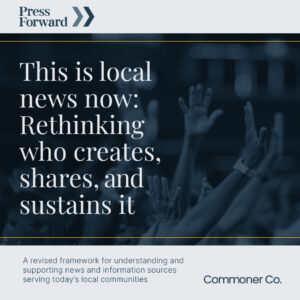The release of Commoner’s new white paper, “This is Local News Now,” couldn’t be better timed – or more hopeful.
Press Forward commissioned this piece months before the federal government defunded public media. But the central thesis of the report gains even more relevance with the impending shutdown of the Corporation for Public Broadcasting, which is already prompting large-scale reimagining of the nation’s 50+ year old civic information infrastructure.
For at least the past decade, there has been a growing disconnect between the framing and language used by many journalism advocates – focused on news deserts, newsroom closures, and reporter layoffs – and the average American’s experience of access to information. More often, members of the public frame their relationship to news as digital overwhelm, chaos, and disengagement.
So how is this hopeful? By identifying three distinct types of local information sources that are vital to modern civic life – and describing with clarity their unique roles, potential, and interconnectedness – Commoner illustrates a wider path forward toward abundance, revitalization and community cohesion.

“This is local news now: Rethinking who creates, shares and sustains it” by Commoner
Instead of the lonely journalist and the overburdened local newsroom carrying the weight of democracy on their shoulders, “This is Local News Now” acknowledges the increasingly important role that community groups, local businesses, and civic institutions play in ensuring local people have access to timely and trusted information. “Influencers” and “content creators” are not just trendy terms, but – put into a broader context – potential allies with legitimate roles to play in fostering productive community engagement and public accountability.
At Press Forward, we see healthy local news ecosystems as constellations of these three types of actors, coming together around a common purpose: equipping residents to understand complex issues, participate in civic life, and uplift their communities. We see our network of chapters as centers of gravity for helping local allies navigate an undeniably chaotic period in the evolution of our nation’s public information infrastructure – bringing the importance of local service, local ownership, local agency and local investment into sharper focus.
None of this is meant to devalue the important and unique role of local journalists. In fact, as Commoner points out, the professional dedication to a code of ethics, independence, nonpartisanship and public service above institutional promotion or personal advocacy is increasingly rare – and ever more valuable. In fact, it’s time to consider what Americans need and value most from professional journalists. A recent national poll and focus groups commissioned by Press Forward indicate it’s the roles of watchdog, sense-maker, curator and community connector.
Meanwhile, in many places local journalists now have a large and often untapped cohort of potential institutional and individual allies creating local content that supports public information and engagement. Commoner adds volumes to our understanding of how these three distinct types of local information stewards can ethically collaborate, to better serve the public.
The resulting vision is playing out in places like New Jersey, where its Civic Information Consortium receives both public funding and philanthropic dollars to support a rich tapestry of civic information sources, ranging from investigative journalism units to community bulletin boards and higher ed programs.
At Press Forward, we are dedicated not only to increasing understanding of and investment in local news as a public good, but also to creating a broader definition of who creates and sustains it. We also hope to create a bigger tent of nonpartisan advocates demanding reliable and sustainable solutions for local news, as people’s expectations and information channels continue to evolve.
We are grateful to Commoner and all who contributed to this report, a follow-up to a January piece supported by Democracy Fund on journalism support organizations, for continuing to bring more clarity to this topic. We look forward to hearing your thoughts.
Melissa Davis is Press Forward’s network manager.

